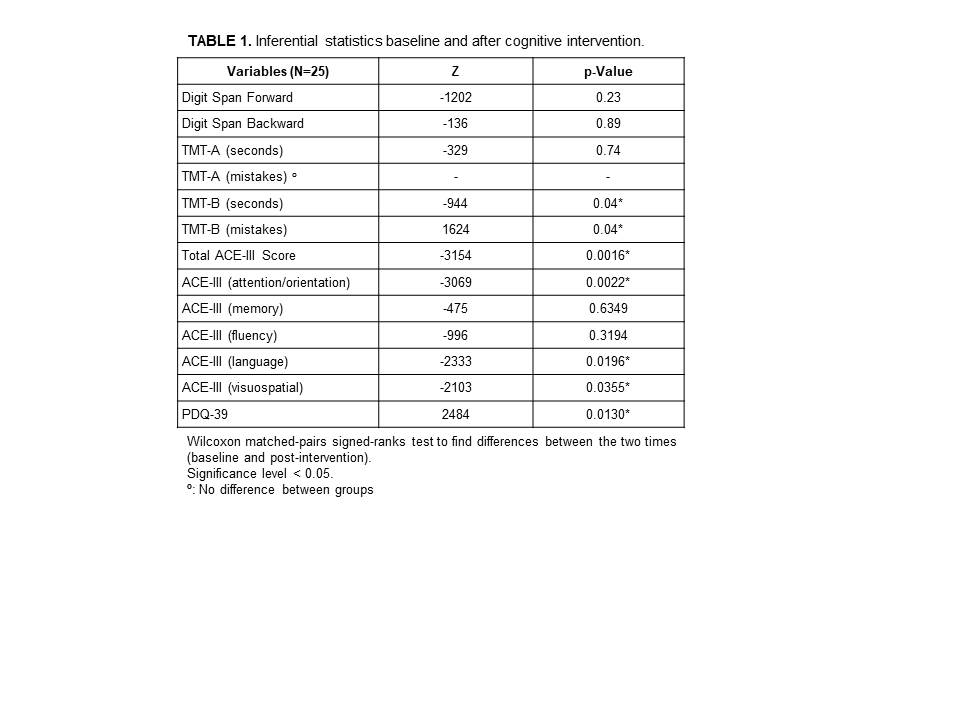Session Information
Date: Wednesday, September 25, 2019
Session Title: Cognition and Cognitive Disorders
Session Time: 1:15pm-2:45pm
Location: Agora 3 East, Level 3
Objective: To determine the impact of cognitive training (CT) on cognitive and quality of life measures in patients with Parkinson’s Disease (PD).
Background: PD is a common neurodegenerative disorder, characterized by motor and nonmotor symptoms. Among the nonmotor features PD, cognitive impairment is one of the most troublesome problems [1]. PD patients have a high risk of developing Mild Cognitive Impairment (MCI) and this is a predictor of dementia and worse disease course. Pharmacological treatments, specifically for MCI, are lacking, and alternative approaches have recently been implemented, including cognitive rehabilitation [2,3,4]. Advances in this area depend on selection of patients with a homogeneous cognitive phenotype as well as definition of appropriate timing of intervention.
Method: Longitudinal and uncontrolled study. Intervention group with up to 6 patients, random sampling, previously evaluated, in eight structured sessions and under standardized mediation. Before and after the intervention, the questionnaire of quality of life (Parkinson’s Disease Questionnaire-PDQ-39), Addenbrooke’s Cognitive Examination III (ACE-III) and executive functions tests (Digit Span and Trail Making Test-TMT, A and B) were applied. Inclusion criteria: severity of Parkinsonian symptoms, evaluated by the Hoehn and Yahr stage (H&Y) until III score; Scores in the Beck Depression and Anxiety Inventories, with minimal and mild intensity (BDI ≤16 and BAI ≤15).
Results: We included 25 patients with MCI (22 men), according to the Movement Disorder Society criteria, divided into four groups. Mean age 64.4 years (max= 75, min= 52), mean schooling of 13.7 years, 6.5 years of disease progression, H-Y stage I in 48%, II in 40% and III in 12%. The patients submitted to the program had significant improvement in the ACE-III scores (mainly in attention, language and visuospatial aspects) [table 1].
Conclusion: This study shows the benefits of cognitive rehabilitation strategies were observed in patients with MCI in PD, with cognitive improvement and quality of life. Engagement in cognitive activities was associated with better cognitive abilities in PD, independent of education, age and duration of disease. It is an ongoing study with some methodological adaptations, such as randomization and control group, in order to increase the efficacy of these findings.
References: 1. Bocanegra Y, Trujillo-Orrego N, Pineda D. [Dementia and mild cognitive impairment in Parkinson’s disease: a review]. Rev Neurol. 2014;59(12):555–69. 2.Cerasa A, Gioia MC, Salsone M et al. (2014). Neurofuncional correlates of attention rehabilitation in Parkinson’s disease: an explorative study. Neurol Sci. 2014;35(8):1173-80. 3. Petrelli A, Kaesberg S, Barbe MT et al. Cognitive training in Parkinson´s disease reduces cognitive decline in the long term. Eur J Neurol. 2015;22(4):640-7. 4. Ventura MI, Edwards JD, Barnes DE et al. More than just a movement disorder: why cognitive training is needed in Parkinson disease. Neurology, 2015; 85(21):1828-9.
To cite this abstract in AMA style:
N. Sousa, A. Neri, I. Brandi, S. Brucki. Cognitive Training in Parkinson’s Disease: Experience in a Rehabilitation Hospital from Brazil [abstract]. Mov Disord. 2019; 34 (suppl 2). https://www.mdsabstracts.org/abstract/cognitive-training-in-parkinsons-disease-experience-in-a-rehabilitation-hospital-from-brazil/. Accessed April 22, 2025.« Back to 2019 International Congress
MDS Abstracts - https://www.mdsabstracts.org/abstract/cognitive-training-in-parkinsons-disease-experience-in-a-rehabilitation-hospital-from-brazil/

